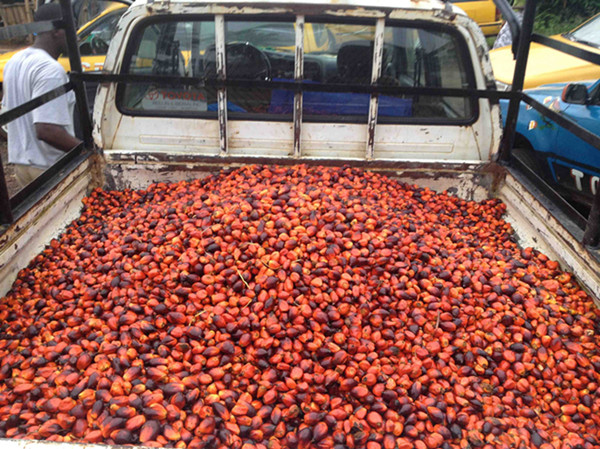Palm oil is everwhere?
FAQ / Chat on line / Give me a price / Date: November 16, 2018
Palm Oil Is Everywher:

Palm fruit is the material of palm oil
Palm oil (Elaeis guineensis) originates from West Africa. Once planted, after 3-4 years’ palm oil trees start to producing its first fruits and will continue all year-round for up to 30 years. Oil Palm is high yielding; it produces more oil per hectare than any other major oil seed crop.
Did you know that half of your items in your house contain palm oil?
Palm oil is also the most widely consumed vegetable oil on the planet. The majority of the household items and food: ice cream, margarine, shampoo, lipstick - all contain palm oil. In Asia, it is used mainly for cooking, while in Europe it is also used in Biofuel. The reason for this is simply because of its efficiency in production. It has virtually no taste and does not melt at high temperature, therefore it makes an excellent ingredient in the most cosmetics and food products, such as chocolate and margarine.
Due to increasing global demand, the production of palm oil has doubled in the 2000’s and is expected to double again by the end of this decade. Today, the vast majority of palm oil comes from large plantations in Southeast Asia. Indonesia and Malaysia supply 85% of palm oil with 50 million tonnes produced per year. Unfortunately, the production of palm oil is widely responsible for massive deforestation in Borneo and Sumatra, putting nature, people and endangered species at risk.
So what is the solution?
Saying no to palm would mean using 6-10 times more land, fuel and resources to produce the same amount of another oil. Likewise, palm oil trees can continually produce 365 days a year up to 30-40 years; this means less stress on the environment than annual crops. Another great benefit is that it provides a constant income to farmers.
The great news is that there is a solution! Sustainable palm oil is the key approach to the production of palm oil without causing deforestation and harming people. Certified Sustainable Palm Oil (CSPO) represents the certification process where palm oil growers must commit to credible sustainability standards through time-bound plans. You can contribute to sustainable palm oil movement by supporting companies that use certified oil in their production, raising awareness among others, and putting pressure on the producers of your favourite products that contain conventional palm oil.
At Natural Habitats, we understand the significance of enhancing endangered species in the wildlife and therefore we do not support any form of deforestation. We are committed to producing certified organic and FairTrade palm oil. In addition to that, we educate and train our smallholder farmers in the preservation of organic farming practices, empower farmer’s assets and capabilities through our advisory programs, preserve heritage and traditional cultures, and provide education and support in healthcare.

Palm fruit is the material of palm oil
Did you know that half of your items in your house contain palm oil?
Palm oil is also the most widely consumed vegetable oil on the planet. The majority of the household items and food: ice cream, margarine, shampoo, lipstick - all contain palm oil. In Asia, it is used mainly for cooking, while in Europe it is also used in Biofuel. The reason for this is simply because of its efficiency in production. It has virtually no taste and does not melt at high temperature, therefore it makes an excellent ingredient in the most cosmetics and food products, such as chocolate and margarine.
Due to increasing global demand, the production of palm oil has doubled in the 2000’s and is expected to double again by the end of this decade. Today, the vast majority of palm oil comes from large plantations in Southeast Asia. Indonesia and Malaysia supply 85% of palm oil with 50 million tonnes produced per year. Unfortunately, the production of palm oil is widely responsible for massive deforestation in Borneo and Sumatra, putting nature, people and endangered species at risk.
So what is the solution?
Saying no to palm would mean using 6-10 times more land, fuel and resources to produce the same amount of another oil. Likewise, palm oil trees can continually produce 365 days a year up to 30-40 years; this means less stress on the environment than annual crops. Another great benefit is that it provides a constant income to farmers.
The great news is that there is a solution! Sustainable palm oil is the key approach to the production of palm oil without causing deforestation and harming people. Certified Sustainable Palm Oil (CSPO) represents the certification process where palm oil growers must commit to credible sustainability standards through time-bound plans. You can contribute to sustainable palm oil movement by supporting companies that use certified oil in their production, raising awareness among others, and putting pressure on the producers of your favourite products that contain conventional palm oil.
At Natural Habitats, we understand the significance of enhancing endangered species in the wildlife and therefore we do not support any form of deforestation. We are committed to producing certified organic and FairTrade palm oil. In addition to that, we educate and train our smallholder farmers in the preservation of organic farming practices, empower farmer’s assets and capabilities through our advisory programs, preserve heritage and traditional cultures, and provide education and support in healthcare.
contact us
- QDo you want to buy machine?
- Yes, I want to buy machine.
- No, I want to learn more in advance.
- QWhat oil seeds do you want to process?
- Palm fruit
- Palm kernel/nut
- Peanut/Groundnut
- Soybean/Soya bean
- Sunflower seed
- Cottonseed
- Rapeseed/Canola
- Dried coconut
- Rice bran
- Corn germ
- More than two oilseeds:
- Other:
- QHow many tons palm fruit bunches will you process per day?
- 1-10 tons per day
- 10-30 tons per day
- 30-50 tons per day
- 50-100 tons per day
- QWhat machine do you want?
- Palm oil presser
- Other single machine (thresher, clarification tank, vibrating screen, filter...)
- Palm oil pressing line (from FFB to crude oil)
- Palm oil refining line (to produce refined, bleached, deodorized oil)
- Palm oil bottling / filling line
- QWhat machine do you want?
- Palm oil pressing line (from FFB to crude oil)
- Palm oil refining line (to produce refined, bleached, deodorized oil)
- Palm oil bottling / filling line
- QHow many tons oil seeds will you process per day?
- 1-20 tons per day
- 20-50 tons per day
- 50-100 tons per day
- QWhat machine do you want?
- Oil presser
- Other single machine (cracker, crusher, roaster, filter...)
- Oil pressing line (from seeds to crude oil)
- Oil refining line (to produce refined, bleached, deodorized oil)
- Oil bottling / filling line
- QWhat machine do you want?
- Oil presser
- Oil pressing line (from seeds to crude oil)
- Oil solvent extraction line
- Oil refining line (to produce refined, bleached, deodorized oil)
- Oil bottling / filling line
- QWhat machine do you want?
- Oil pressing line (from seeds to crude oil)
- Oil solvent extraction line
- Oil refining line (to produce refined, bleached, deodorized oil)
- Oil bottling / filling line



